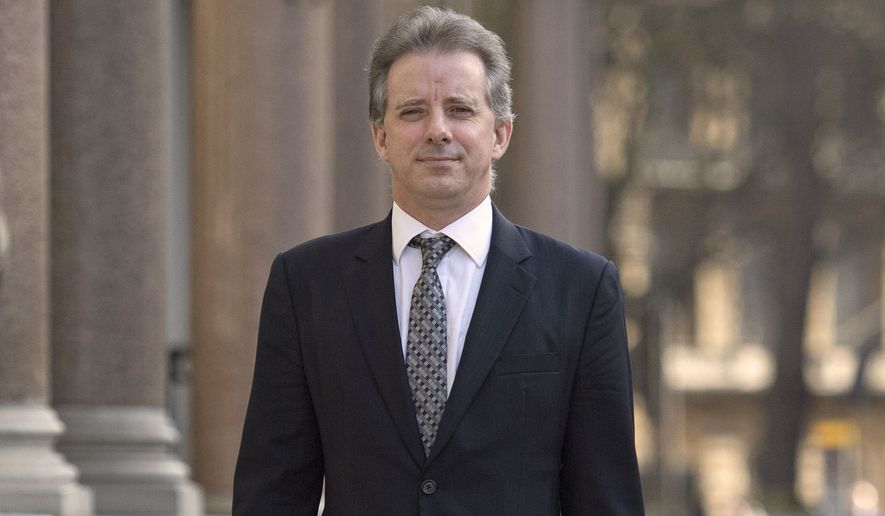The infamous anti-Trump dossier, once toasted by the FBI and liberals, has faded from Washington’s political dialogue.
The FBI had embraced the opposition research written by former British spy Christopher Steele and funded by the Hillary Clinton campaign and the Democratic National Committee in 2016. Congressional Democrats frequently cited its unverified collusion charges in 2017.
Today, Democrats seem to have left the document behind.
References to the dossier are nonexistent in “The Threat,” the newly released memoir of former acting FBI Director Andrew McCabe. There is also no mention of dossier writer Mr. Steele or Fusion GPS, the investigative firm that hired him — and continues to investigate President Trump with Democratic funding.
Michael Caputo, a Trump campaign adviser who endured hours of investigators’ questions over Trump-Russia suspicions, told The Washington Times that he isn’t surprised Mr. McCabe left all of it out of his book.
“The dossier is the linchpin of McCabe’s meddling in the 2016 election, and the Russian intelligence information provided to him by the Clinton campaign was central to keeping an important stage of the bogus Trump investigations alive,” Mr. Caputo said. “Now that we know he weaponized FBI investigations to destroy the president and his allies, it doesn’t surprise me at all that he’d like us all to forget the Clinton-Kremlin dossier. The dossier will be his undoing.”
Mr. McCabe had at least one key meeting about the dossier in August 2016 as the FBI ramped up an investigation of the Trump campaign. His close bureau associates, agent Peter Strzok and counsel Lisa Page, also received dossier briefings during the campaign. The trio’s briefer was Justice Department attorney Bruce Ohr. A word search of Mr. McCabe’s memoir comes up empty on Mr. Ohr.
As of Wednesday on his book tour, Mr. McCabe did not have one media question about the dossier, The Daily Caller reported. The same media handed out a prestigious White House press award to CNN for reporting the dossier’s existence in January 2017.
Likewise, former FBI Director James B. Comey downplayed the dossier in his 2018 memoir, “A Higher Loyalty.” He wrote briefly about the document, such as the time he briefed President-elect Trump about it in their first meeting.
But on his book tour, Mr. Comey said he didn’t know who first briefed him on the dossier’s existence. He said he doesn’t know who funded it and argued that it doesn’t matter.
A House Republican report said the FBI was aware weeks before the election that Democrats had funded the dossier.
“My understanding that the activity was begun, that Steele was hired to look into was first funded by Republicans, then picked up, the important thing was, picked up by Democrats opposed to Donald Trump,” Mr. Comey told Fox News’ Bret Baier.
His answer conflicts with the known record: Fusion did not hire Mr. Steele until it had acquired funds from the Clinton campaign and the DNC, according to congressional testimony.
Rep. Adam B. Schiff, California Democrat and chairman of the House Permanent Select Committee on Intelligence, lavished Mr. Steele with praise in 2017. As the committee’s top Democrat, he read Mr. Steele’s charges at a much-watched hearing that March. So did his fellow liberal committee members.
Today, he has ramped up another Russia investigation. He said he will continue his hunt even if special counsel Robert Mueller finds no collusion.
Missing from his detailed Feb. 6 mission statement is any mention of Mr. Steele’s evidence or the dossier. A check of transcripts from Mr. Schiff’s January and February appearances on CNN, NBC and MSNBC did not uncover a dossier reference.
Of Mr. Steele’s dozen or so criminal charges of collusion, none has been proved publicly. No Trump associate has been charged in any conspiracy with Russia.
Mr. Mueller has brought two sets of indictments against Russian hackers and social media trolls. No American knowingly took part, the indictment says.
Rep. Devin Nunes, California Republican and former House intelligence committee chairman, spent months investigating the FBI’s use of the dossier.
Asked why the FBI appears to have put aside the dossier, Nunes spokesman Jack Langer said, “McCabe didn’t mention it because they’re trying to memory-hole it.”
Mr. McCabe’s spokeswoman didn’t respond to two emails seeking comment.
Here is how the FBI used and relied on the dossier:
⦁ Mr. Comey’s first meeting with Mr. Trump involved briefing the president-elect on the dossier allegations against him. Mr. Comey didn’t tell Mr. Trump that the dossier was Democratic opposition research.
⦁ Mr. Comey said the FBI tried to confirm each dossier charge. “What can we replicate?” he said during his book tour.
⦁ The FBI cited the dossier as evidence to get at least one known wiretap warrant on Trump campaign volunteer Carter Page. The bureau didn’t tell the judge who authorized the warrant that the Democratic Party financed the dossier.
⦁ The FBI was one of the agencies that included the dossier in an appendix to the intelligence community’s assessment that Russia hacked Democratic Party computers and committed the crime to help candidate Trump.
⦁ FBI officials received multiple dossier briefings from Mrs. Clinton’s political operatives and visited Mr. Steele in Britain to receive allegations firsthand.
Among the dossier’s most sensational charges: Mr. Trump was a Russian informant for eight years; then-Trump attorney Michael Cohen traveled to Prague to meet with Kremlin figures and plan a cover-up; and Mr. Page and campaign chairman Paul Manafort together orchestrated the hacking with Moscow.
No public evidence has surfaced to substantiate those charges. Mr. Page and Manafort have never met.
• Rowan Scarborough can be reached at rscarborough@washingtontimes.com.




Please read our comment policy before commenting.